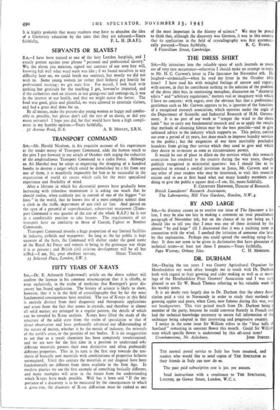TRANSPORT COMMAND
Sta,—Mr. Harold Nicolson, in his exquisite account of his experiences at the tender mercy of Transport Command, adds the human touch to the plea I put forward in my article of October 19th urging the reduction of the amplitudinous Transport Command to a cadre Force. Although an Air Marshal may be adept at organising the dropping of a hundred bombs to destroy a target which could be demolished by a hit from any one of them, it is manifestly impossible for him to be successful in the organisation of world air routes which calls for the most specialised experience and flexibility of mind.
After a lifetime in which his dictatorial powers have gradually been increasing with relentless momentum it is asking too much that he should realise, when suddenly put in control of one of the biggest "air lines " in the world, that he knows less of a most complex subject than a clerk in the traffic department of any civil air line. And poised on the apex of a pyramid of superabundant, subservient manpower (Trans- port Command is one quarter of the size of the whole R.A.F.) he is not in a comfortable position to take lessons. The requirements of air transport have no similarity to those of Coastal, Fighter or Bomber Commands.
Transport Command absorbs a huge proportion of our limited facilities in industry, airfields and manpower. So long as the lay public is kept unaware of the facts, the Command will shelter under the good name of the Royal Air Force and remain in being in the grotesque war shape it is at present ; and British civil aviation development will be all but
stifled.—I am, Sir, your obedient servant, NIGEL TANGYE. 15 Selwood Place, London, S.W. 7.


























 Previous page
Previous page